‘We are Attached to Wars and This is Tragic’
Pope’s Address to the Participants in the Plenary Assembly of the Congregation for the Oriental Churches
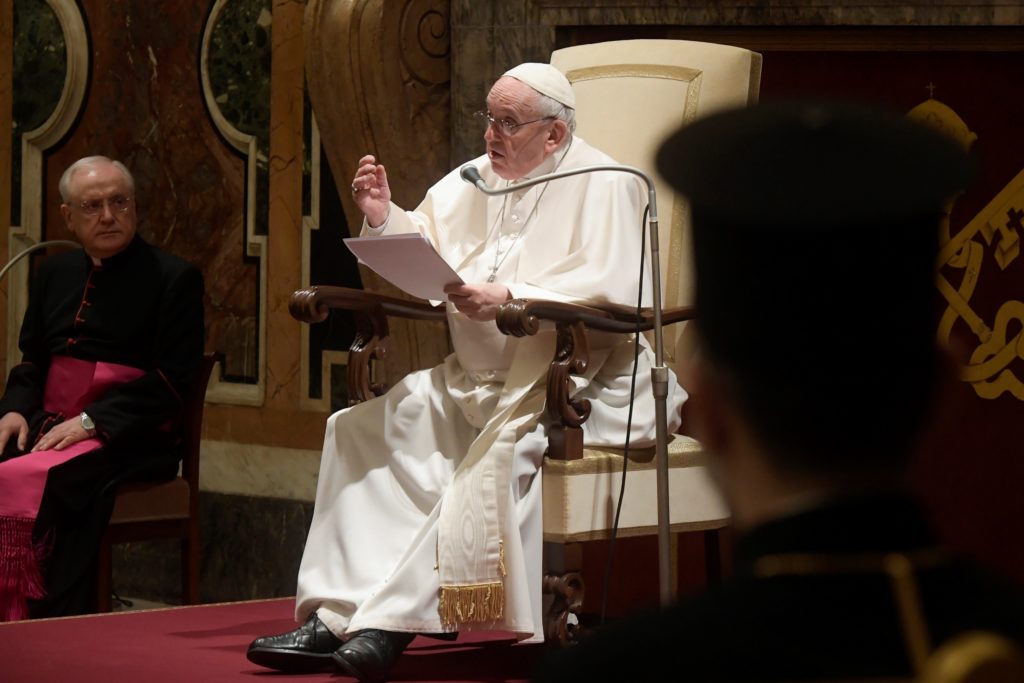
“We are attached to wars and this is tragic. Humanity, which is proud to be in the lead in science, in thought, in so many beautiful things, is staying behind in the weaving of peace. It’s a champion in making war, and this makes us all ashamed. We must pray and ask forgiveness for this attitude,” said Pope Francis.
The Holy Father was addressing the participants in the Plenary Assembly of the Congregation for the Oriental Churches, who went today, February 18, 2022, to their private audience with the Holy Father in the Vatican’s Apostolic Palace.
Hear the Call for Peace
At the beginning of his address, and quoting Pope Benedict XV, Francis pointed out that in Christ’s Church “there is no discrimination among her children, and that all, Latins, Greeks, slaves and other nationalities have equal importance.” With so many wars today, this call “is not being heard. It seems that the greatest prize for peace should be given to wars: <such> a contradiction!”
“Humanity seems to continue groping in the darkness: we have witnessed the massacres of the Middle East conflicts, in Syria and Iraq; of the Ethiopian region of Tigray; and threatening winds continue to blow in the steppes of Eastern Europe, lighting the fuses and fires of arms and leaving frozen the hearts of the poor and the innocent,” he continued.
The Path of Eastern Catholics
The Pontiff said that “for decades, Eastern Catholics inhabit distant Continents; they have crossed seas and oceans and gone across plains. Eparchies have already been created in Canada, in the United States, in Latin America, in Europe <and> in Oceania.” Hence, “their work was concerned with evangelization, which constitutes the Church’s identity in all her parts and is, moreover, the vocation of all the baptized. And for the mission, we need to <appreciate> more the richness of the different traditions.”
An example is “the itinerary of the catechumenate for adults, which provides for the celebration of the Sacraments of Christian Initiation in a unified way: a custom that is kept in the Oriental Churches and practiced also for children.” Observed in it is “the importance of a wise mystagogic catechesis, which accompanies the baptized of all ages in a mature and joyful belonging to the Christian community. In the Latin Church, we are lacking this mystagogic catechesis.”
Synodality Is to Walk Together under the Guidance of the Holy Spirit
The Holy Father stressed that “the synodal way isn’t a parliament, it’s not about proffering different opinions and then doing a summary or having a vote, no. The synodal way is to walk together under the guidance of the Holy Spirit (. . . ) The Spirit is in synodality, and when the Spirit isn’t there it’s only a Parliament or an opinion survey, but not a Synod.”
“The liturgical assembly is recognized as such not because it convokes itself, but because it listens to the voice of the Other, remaining directed to Him, and for that very reason it feels the urgency to go forth to brothers, bring them the proclamation of Christ.”
Originality and Communion
Recalling the path marked by Vatican Council II, the Bishop of Rome asserted that “it’s very good that each component of the one symphonic Catholic Church be always listening to the other traditions, their ways of research and reform, keeping each one in its own originality.”
“In regard to the way of celebration it’s necessary to live unity in keeping with what was established by the Synods and approved by the Apostolic See, avoiding liturgical particularities that, in reality, manifest divisions of another type within the respective Churches,” he argued.
Finally, the Successor of Peter invited to avoid “experiments that can harm the path to the visible unity of all Christ’s disciples. The world needs the witness of communion: if we cause scandal with liturgical disputes and, unfortunately, there have been some recently, we play the game of the one who is master of division.”
Here is the Holy Father’s full address, translated by Exaudi.
* * *
Dear Brothers and Sisters, good morning and welcome!
I thank Cardinal Sandri for his words of greeting and presentation, and I thank each one of you for your presence, especially those of you who came from afar.
This morning you prayed before the Confession of the Apostle Peter, renewing together your profession of faith” “Thou art Christ, the Son of the living God.” The same gesture we did before the Mass at the beginning of our pontificate, to show, as Pope Benedict XV said, that “in the Church of Jesus Christ, which isn’t Latin, or Greek, or Slav and other nationalities have equal importance” (Encyclical Dei Providentis, May 1, 1917). To him, founder of the Congregation for the Oriental Churches and of the Pontifical Oriental Institute, goes our grateful remembrance, one hundred years after his death. He denounced the incivility of the war as “useless killing.” His warning wasn’t heard by the leaders of the nations involved in World War I, as the appeal of Saint John Paul II was not heard, to avoid the conflict in Iraq.
As in the present, when there are so many wars everywhere, this appeal both of the Popes as well as of men and women of good will isn’t heard. It seems that the greatest prize for peace should be given to wars: such a contradiction! We are attached to wars, and this is tragic. Humanity, which is proud to be in the lead in science, in thought, in many beautiful things, is staying behind in making peace. It’s a champion in making wars, and this makes us all ashamed. We must pray and ask forgiveness for this attitude.
We hoped it wouldn’t be necessary to repeat similar words in the third millennium; however, humanity seems to continue groping in the darkness: we have been witnesses of the massacres of the conflicts of the Middle East, in Syria and Iraq; of those of the Ethiopian region of Tigray; and the threatening winds in the steppes of Eastern Europe continue blowing, lighting the fuses and fires of arms and leaving frozen the hearts of the poor and the innocent. Meanwhile, the drama of Lebanon continues, leaving many people without bread. Young people and adults have lost hope and are abandoning these lands. However, they are the homeland of the Oriental Catholic Churches, which developed there, keeping their ancient traditions and many of you, members of the Dicastery, are their children and heirs.
Your daily life is, therefore, a mixture of the precious gold dust of your past and the heroic witness of the faith of many in the present, together, however, with the clay of the miseries of which we are also responsible and the pain caused by external forces. Or they are seeds in the stems and branches of hundred-year-old plants, carried by the wind to unthinkable borders: for decades Eastern Catholics have dwelt in distant Continents; they have crossed seas and oceans and gone across plains. Eparchies have already been created in Canada, in the United States, in Latin America, in Europe, in Oceania, and many others are entrusted, at least for the time being, to Latin Bishops, who coordinate pastoral action through priests sent in keeping with the correct procedures by their respective Church Leaders, Patriarchs, Major Archbishops or Metropolitans sui iuris.
Hence, their work was concerned with evangelization, which constitutes the identity of the Church in all her parts and is, moreover, the vocation of all the baptized. And, for the mission, we must <appreciate> more the richness of the different traditions. I’m thinking, for example, of the itinerary of the catechumenate for adults, which provides for the celebration of the Sacraments of Christian Initiation in a unified way: a custom that is kept in the Oriental Churches and is also practiced for children. In both paths, we can see the importance of a wise mystagogic catechesis, which accompanies the baptized of any age to a mature and joyful belonging to the Christian community. We are lacking this mystagogic catechesis in the Latin Church. Precious in this path are the different ministries in the Church, as well as the harmony in relations with men and women religious, who work according to their charisms also in your contexts. Over these days you have reflected on all these aspects.
There is an experience in which the “clay” of our humanity lets itself be molded, not by changing opinions or by necessary sociological analyses, but by the Word and the Spirit of the Risen Lord. This experience is liturgical. And this also makes us think in a synodal way. The synodal way isn’t a parliament, it doesn’t express different opinions and then have a summary or a vote, no. The synodal way is to walk together under the guidance of the Holy Spirit, and you, in your Churches, have Synods, ancient synodal traditions, and you are witness of this. The Spirit is in synodality, and when there is no Spirit, there is only a Parliament or an opinion survey, but not a Synod. This experience — I was saying — is Heaven on earth, and this happens in the liturgy, as he likes to repeat especially to the East. However, the beauty of the Eastern rites is far from being an oasis of evasion or preservation. The liturgical assembly is recognized as such not because it convokes itself, but because it listens to the voice of the Other, remaining directed to Him, and, therefore, feels the urgency to go forth to brothers, bring the proclamation of Christ to them. The traditions that keep the use of the iconostasis, with the royal door or the veil that conceals the sanctuary in specific moments of the rite, also teaches us that such architectonic or ritual elements do not transmit the idea of God’s remoteness but, on the contrary, exalt the mystery of His condescension — of the syncatabasis — in which the Word came and comes to the world.
The Liturgical Conference for the 25th anniversary of the Instruction on the implementation of the liturgical prescriptions of the Code of the Canons of the Oriental Churches is an opportunity to get to know one another in the heart of the Liturgical Commissions of the different Churches sui iuris. It is an invitation to walk with the Dicastery and its Consultors, in keeping with the path indicated by the Second Ecumenical Vatican Council. In this path, it’s very good that each component of the one symphonic Catholic Church be always listening to the other traditions, their ways of research and reform, each one keeping its own originality. Fidelity to their own originality is what makes the symphonic richness of the Oriental Churches. One can ask, for example, for the possible introduction of editions of the liturgy in the languages of the countries where their faithful have spread. However, regarding the form of the celebration, it’s necessary to live unity as established by the Synods and approved by the Apostolic See, avoiding liturgical particularities that, in reality, manifest divisions of another type within the respective Churches. Moreover, let’s not forget that brothers of the Orthodox Churches and Oriental Orthodox Churches observe us: although we might not be able to sit at the same Eucharistic table, yet we almost always celebrate and pray the same liturgical texts. Let us beware, then, of experiments that, can harm the path to visible unity of all Christ’s disciples. The world needs the witness of communion: if we cause scandal with liturgical disputes — and, unfortunately, there have been some recently –, we play the game of the one who is master of division.
Dear brothers and sisters, I thank you for your work over these days, I’m always close to you in prayer. Take my encouragement and blessing to your faithful. And, please, don’t forget to pray for me. Thank you.
© Libreria Editrice Vatican
Translation by Virginia M. Forrester
Related
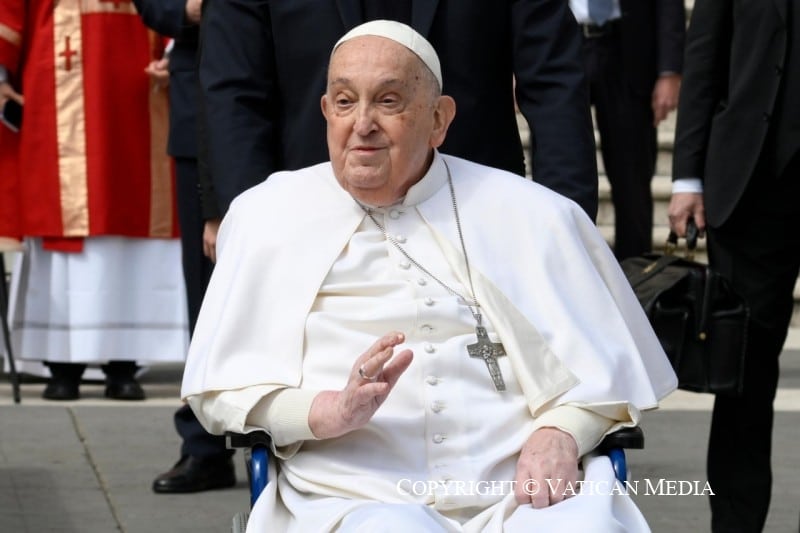
Palm Sunday: “Father, into your hands I commend my spirit”
Exaudi Staff
13 April, 2025
2 min
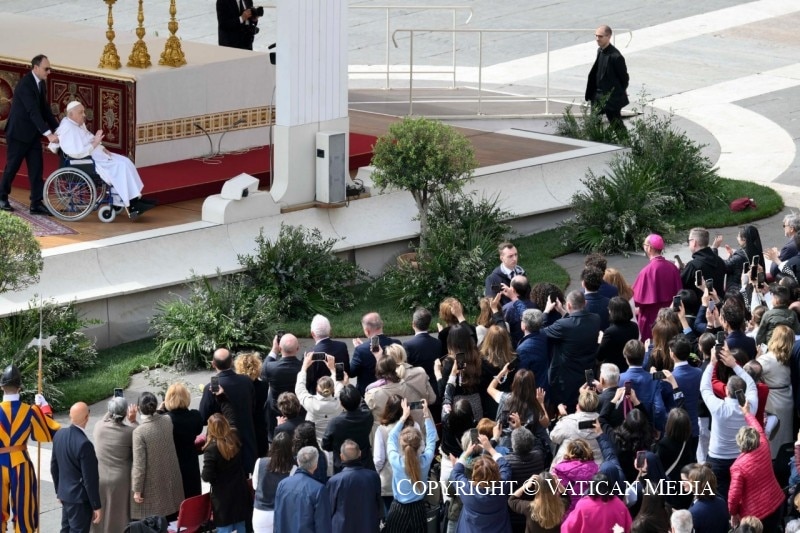
“Jesus’ passion becomes compassion when we reach out to those who can no longer bear it”
Exaudi Staff
13 April, 2025
5 min
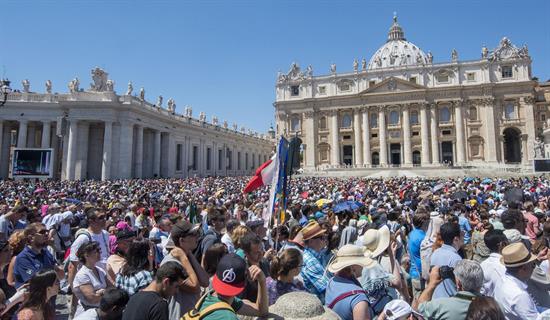
Pope Francis Sends a Message of Hope to the Young People of the UNIV 2025 International Congress
Exaudi Staff
11 April, 2025
5 min
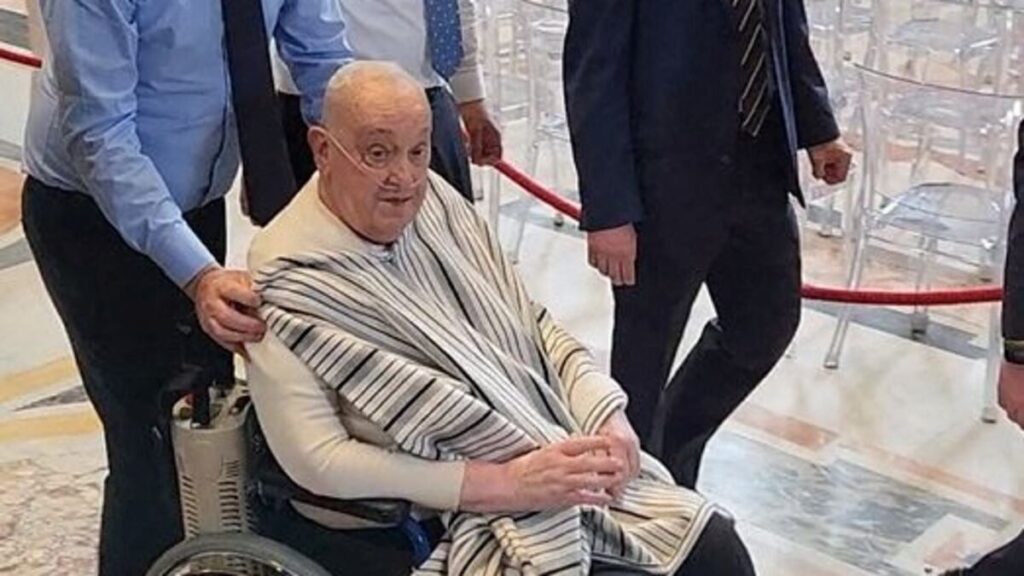
Pope Francis continues his recovery at Santa Marta with signs of improvement
Exaudi Staff
11 April, 2025
1 min
 (EN)
(EN)
 (ES)
(ES)
 (IT)
(IT)

